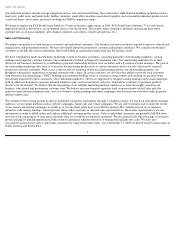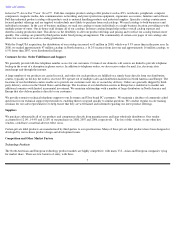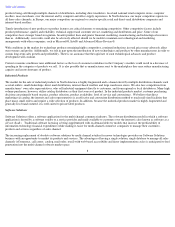Circuit City 2008 Annual Report Download - page 17
Download and view the complete annual report
Please find page 17 of the 2008 Circuit City annual report below. You can navigate through the pages in the report by either clicking on the pages listed below, or by using the keyword search tool below to find specific information within the annual report.
Table of Contents
•
Increased costs associated with corporate governance compliance may impact our results of operations.
As a public company, we incur significant legal, accounting and other expenses that we would not incur as a private company. In
addition, the Sarbanes-Oxley Act of 2002, as well as rules subsequently implemented by the Securities and Exchange Commission
and listing requirements subsequently adopted by the New York Stock Exchange in response to Sarbanes-Oxley, have required
changes in corporate governance practices of public companies. These developments have substantially increased our legal
compliance, auditing and financial reporting costs and made them more time consuming. These developments may also make it more
difficult and more expensive for us to obtain directors’ and officers’ liability insurance and we may be required to accept reduced
coverage or incur substantially higher costs to obtain coverage, possibly making it more difficult for us to attract and retain qualified
members of our board of directors, particularly to serve on our audit committee.
•
Our success is dependent upon the availability of credit and financing.
We require significant levels of capital in our business to finance accounts receivable and inventory. We maintain credit facilities in
the United States and in Europe to finance increases in our working capital if available cash is insufficient. The amount of credit
available to us at any point in time may be adversely affected by the quality or value of the assets collateralizing these credit lines. In
addition, if we are unable to renew or replace these facilities at maturity our liquidity and capital resources may be adversely
affected. However, we currently have no reason to believe that we will not be able to renew or replace our facilities when they reach
maturity.
•
Sales to individual consumers exposes us to credit card fraud, which could adversely affect our business.
Failure to adequately control fraudulent credit card transactions could increase our expenses. Increased sales to individual consumers,
which are more likely to be paid for using a credit card, increases our exposure to fraud. We employ technology solutions to help us
detect the fraudulent use of credit card information. However, if we are unable to detect or control credit card fraud, we may suffer
losses as a result of orders placed with fraudulent credit card data, which could adversely affect our business.
•
Our income tax rate and the value of our deferred tax assets are subject to change.
Changes in our income tax expense due to changes in the mix of U.S. and non-
U.S. revenues and profitability, changes in tax rates or
exposure to additional income tax liabilities could affect our profitability. We are subject to income taxes in the United States and
various foreign jurisdictions. Our effective tax rate could be adversely affected by changes in the mix of earnings in countries with
differing statutory tax rates, changes in the valuation of deferred tax assets and liabilities, changes in tax laws or by material audit
assessments. The carrying value of our deferred tax assets, which are primarily in the United States and the United Kingdom, is
dependent on our ability to generate future taxable income in those jurisdictions. In addition, the amount of income taxes we pay is
subject to ongoing audits in various jurisdictions and a material assessment by a tax authority could affect our profitability.
15
























